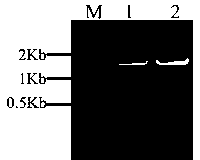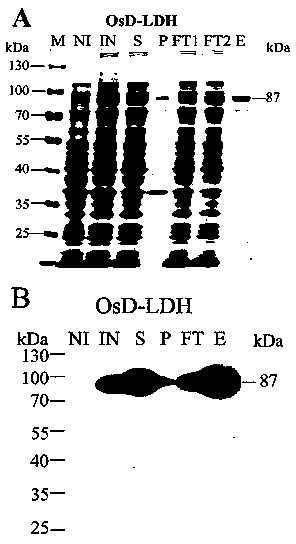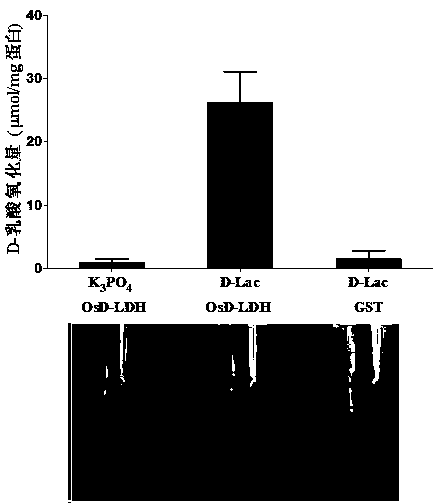Novel paddy rice D-lactate dehydrogenase, coding gene and application thereof
A lactate dehydrogenase and coding gene technology, applied to a new type of rice D-lactate dehydrogenase and its coding gene and application fields, can solve problems such as aggravation of pests and diseases, pollution, crop yield reduction and the like
- Summary
- Abstract
- Description
- Claims
- Application Information
AI Technical Summary
Problems solved by technology
Method used
Image
Examples
Embodiment 1
[0035] Embodiment 1, the cloning of rice OsD-LDH gene
[0036] The young leaves and roots of indica rice 93-11 were taken, ground with liquid nitrogen, and the total RNA was extracted according to the Trizol method (Invitrogen), and the mixed DNA was digested with DNase I (Fermentas); 18 As primers, cDNA was obtained by reverse transcription with Superscript II (Invitrogen). All the above experiments were carried out according to the instructions of the kit.
[0037] Based on Arabidopsis D-lactate dehydrogenase (AtD-LDH) sequence (Engqvist M, Drincovich MF, Flügge U-I, Maurino VG (2009) Two d-2-hydroxy-acid dehydrogenases in Arabidopsis thaliana with catalytic capacities to participate in the last reactions of the methylglyoxal and β-oxidation pathways.Journal of Biological Chemistry284:25026-25037) BLAST the rice genome sequence to obtain the corresponding homologous sequence, design primers using cDNA as template, and use high-fidelity amplification enzyme pfu for RT-PCR am...
Embodiment 2
[0042] Example 2, OsD-LDH induced expression purification and catalytic activity identification
[0043] (1) Construction of prokaryotic expression vector
[0044] Using the correctly sequenced OsD-LDH clone as a template, high-fidelity amplification enzyme pfu was used to amplify OsD-LDH by PCR. The amplification reaction system and procedure were the same as in Example 1, and the primers used were shown in the table below.
[0045]
[0046] The fragment was recovered, digested with Sal I and Not I, and connected into the prokaryotic expression vector pGEX-6P-1, transformed into Escherichia coli DH5α, and the positive clone was sent for sequencing, and the sequenced correct clone was transformed into the Escherichia coli expression strain BL21(DE3 ).
[0047] (2) Induced expression and purification of OsD-LDH protein
[0048] 1) Pick a single colony containing the recombinant plasmid and put it into 15mL LB (ampicillin (Amp) 50μg / mL), culture overnight at 37°C and 220rpm...
Embodiment 3
[0076] Example 3, Analysis of the expression pattern of OsD-LDH in different tissues at different developmental stages of rice
[0077] Samples of indica rice 93-11 at different development stages were taken, ground with liquid nitrogen, and total RNA was obtained by removing DNA according to the method in Example 1. After chloroform extraction to remove DNase I, Oligod(T) 18 As primers, cDNA was obtained by reverse transcription with M-MLV (Promega). All the above experiments were carried out according to the instructions of the kit.
[0078] Using the obtained cDNA as a template, design primers for real-time fluorescent quantitative PCR (qRT-PCR), the instrument used in the experiment is Bio-Rad CFX96 TM Real-time system (Real-time system), the reagent is iQ TM SYBR Green Supermix, quantitative PCR results were analyzed by Bio-Rad CFX Manager software, and all quantitative expression results were compared with at least 3 internal reference genes.
[0079] The real-time f...
PUM
 Login to View More
Login to View More Abstract
Description
Claims
Application Information
 Login to View More
Login to View More - R&D
- Intellectual Property
- Life Sciences
- Materials
- Tech Scout
- Unparalleled Data Quality
- Higher Quality Content
- 60% Fewer Hallucinations
Browse by: Latest US Patents, China's latest patents, Technical Efficacy Thesaurus, Application Domain, Technology Topic, Popular Technical Reports.
© 2025 PatSnap. All rights reserved.Legal|Privacy policy|Modern Slavery Act Transparency Statement|Sitemap|About US| Contact US: help@patsnap.com



